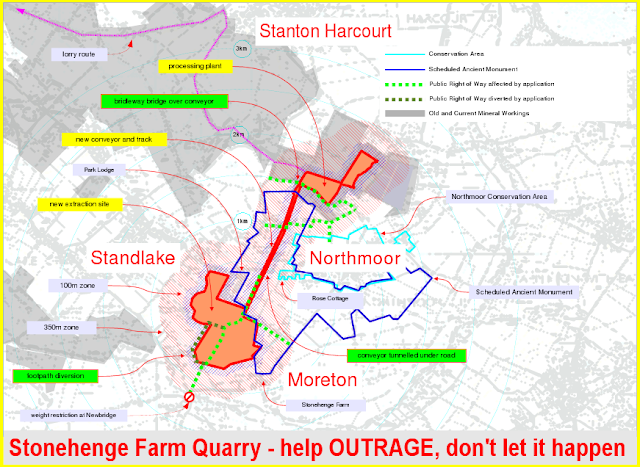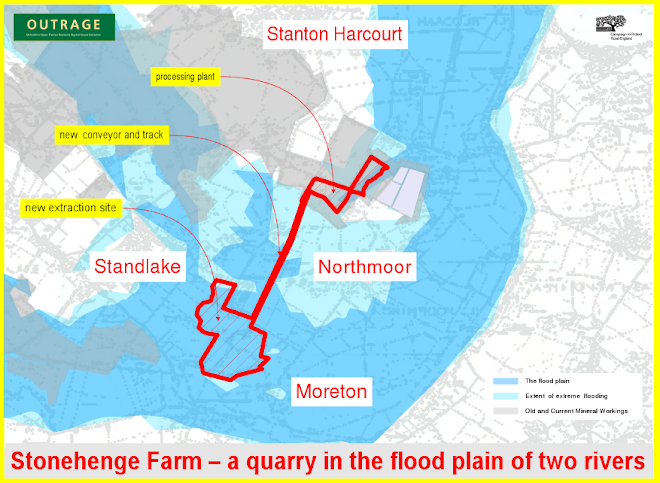A great deal has happened. There was the meeting of OCC Planning and Regulation Committee on 12 November 2009, and then the first day of the Public Inquiry, at which were were all told to go away and come back on 13 April 2010 - more about that in a separate post. In between these events we were extremely busy with last minute preparations for what we thought would be the first day of an 8-day Inquiry.
And there was Race Night on Saturday night, a wonderful evening, and very successful. Loud thanks and congratulations to Gai, Emma and Jane and to everyone who helped make it happen and made it such fun. There's a lot to say, and many to thank, but that too belongs in a separate post.
As for the planning committee, the OUTRAGE 5-minute address to the Planning Committee concentrated entirely on HGV routeing. Terry Kirkpatrick spoke for the Residents of Moreton on flooding, and Robert Florey spoke as Chairman of Northmoor Parish Council and as a long-standing resident and farmer in Northmoor. Steve Good spoke for the businesses at Park Farm, and finally Councillor Charles Mathew addressed the Committee.
The OUTRAGE address finished with the quote from MPG2. This was pretty effective at first. The legal department's corner of the table went into scurry-about overdrive and emerged looking happy with a reference to the 'well being power' in the Local Government Act 2000 as trumping the ancient guidance in MPG2 (they said from the early 90s, but in fact MPG2 was published in 1998, later than the semi-obsolete Oxfordshire Minerals and Waste Local Plan 1996, if we are really going to get into policy ageism).
The OUTRAGE address finished with the quote from MPG2. This was pretty effective at first. The legal department's corner of the table went into scurry-about overdrive and emerged looking happy with a reference to the 'well being power' in the Local Government Act 2000 as trumping the ancient guidance in MPG2 (they said from the early 90s, but in fact MPG2 was published in 1998, later than the semi-obsolete Oxfordshire Minerals and Waste Local Plan 1996, if we are really going to get into policy ageism).
Here's a quote from a study of the 'well being power':
1.2 A description of the Well Being powerPart 1 of the Local Government Act 2000 provides local authorities with a discretionary power (the Well Being power) to undertake any action to promote or improve the social, economic and environmental well being of their area (section 2). The power is designed to: encourage innovative practice by removing some of the uncertainty over the extent of existing enabling powers, provide opportunities for local authorities, together with their partners, to pursue issues raised through a variety of mechanisms, help facilitate the removal of legislative provisions that can be demonstrated to circumscribe local authorities’ activities under the well being powers (section 5) and facilitate the local authority intervention across existing authority boundaries if this is likely to improve well being.
Our legal adviser commented later that it could not have been the intention of parliament that the 'well being power' would be used to override national guidance which is there specifically to protect local communities.
But as usual the meeting was pretty forcibly steered by the officers - loud barks whenever it looked as if the sheep might be beginning to choose the wrong gate. Apparently the Minerals Department has worked hard with everyone to construct a strong robust case, in the Appeal though the outcome is a compromise on the routeing agreement, and strong hints that the flooding objection will evaporate in the strong light of flood model analysis.
The officers promised the Committee a very shiny new generation routeing agreeement, completely different from the boring old-fashioned routeing agreements that we know about. The members seemed very sceptical.
One member pointed out that the 3 strikes and you're out rule with 3 random monitoring events a year means that offenders would have to be exceptionally unlucky to be caught three times, and even then it would take over a year for any action to be taken, and even then a small one-man band could quite easily use a new company to carry on as before. There was a general sense (with two former or actual lorry drivers on the committee) that drivers are quite good at evading rules of this kind.
One member pointed out that the 3 strikes and you're out rule with 3 random monitoring events a year means that offenders would have to be exceptionally unlucky to be caught three times, and even then it would take over a year for any action to be taken, and even then a small one-man band could quite easily use a new company to carry on as before. There was a general sense (with two former or actual lorry drivers on the committee) that drivers are quite good at evading rules of this kind.
This scepticism did not translate into votes - only 2 voted against the resolution to withdraw OCC's routeing objection, and that without sight of any new routeing agreement. The committee did attach an amendment about signage to the resolution. Until they publish the words, I don't think anyone knows what exactly they meant, but it seems the intention is that the routeing agreement should be reflected in signs at the exit from Dix Pit.
It all looks a mess. The chairman and the officers themselves recognised that this is not an easy site for routeing agreements. As Councillor Mathew pointed out, there are 43 commercial operations at various parts of the Stanton Harcourt sites, most of them not covered by routeing agreements, so this is clearly a case in which not even the shiniest routeing agreement can work.
Terry Kirkpatrick was forceful and clear. Hanson, the Environment Agency and OCC had told him there was no need for 2D modelling of the rivers in this complex and difficult floodplain. But as soon as Hanson appealed they belatedly offered to do the modelling they had always said was not needed. The results as yet are unclear, but Terry says the modelling cannot be relied on as evidence that the quarry will not increase flooding. OCC's consultant agreed that it was possible that the effect of a quarry on the timing of flood peaks from two rivers could make flooding worse.
The EA has told Robert Florey in fine detail what he can and can't do to conserve the biodiversity of one small pond, but say Hanson's quarries and bunds are no problem - it looks like one rule for them and another for us.
Steve Good reminded the committee that small businesses may not survive the costs and disruption that flooding can bring.
Charles Mathew explained to the committee that there was a public perception that the playing field was uneven, that the goal posts were wandering all over the pitch. The decision to delegate was distrusted - the committee should stand by their objections.
None of this had any effect, except that OCC tacked on a request that the Inspector adjourn the inquiry until the results of the flood modelling is known.
On 16 November OCC sent their formal request for adjournment. There was a flurry of phone calls and emails. Hanson almost immediately added their voice for adjournment. The Inspector by now was on the road. So the stage was set for a very short show.
Terry Kirkpatrick was forceful and clear. Hanson, the Environment Agency and OCC had told him there was no need for 2D modelling of the rivers in this complex and difficult floodplain. But as soon as Hanson appealed they belatedly offered to do the modelling they had always said was not needed. The results as yet are unclear, but Terry says the modelling cannot be relied on as evidence that the quarry will not increase flooding. OCC's consultant agreed that it was possible that the effect of a quarry on the timing of flood peaks from two rivers could make flooding worse.
The EA has told Robert Florey in fine detail what he can and can't do to conserve the biodiversity of one small pond, but say Hanson's quarries and bunds are no problem - it looks like one rule for them and another for us.
Steve Good reminded the committee that small businesses may not survive the costs and disruption that flooding can bring.
Charles Mathew explained to the committee that there was a public perception that the playing field was uneven, that the goal posts were wandering all over the pitch. The decision to delegate was distrusted - the committee should stand by their objections.
None of this had any effect, except that OCC tacked on a request that the Inspector adjourn the inquiry until the results of the flood modelling is known.
On 16 November OCC sent their formal request for adjournment. There was a flurry of phone calls and emails. Hanson almost immediately added their voice for adjournment. The Inspector by now was on the road. So the stage was set for a very short show.
















